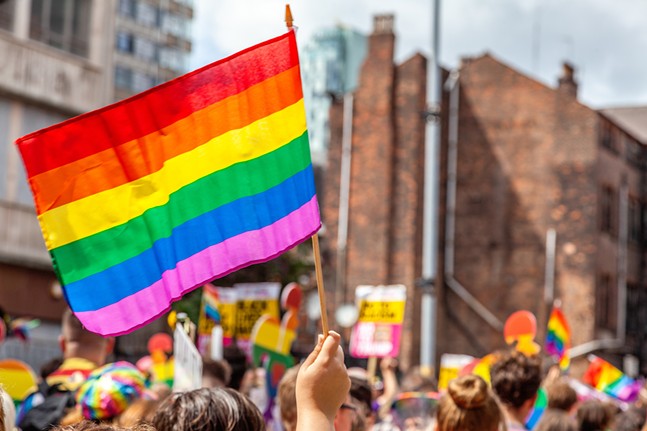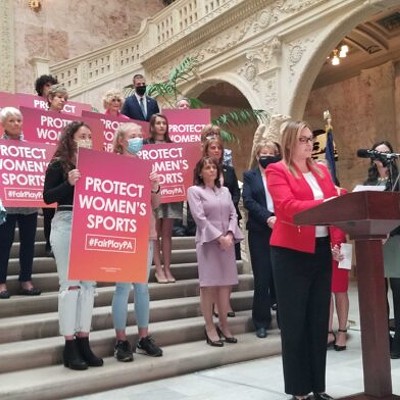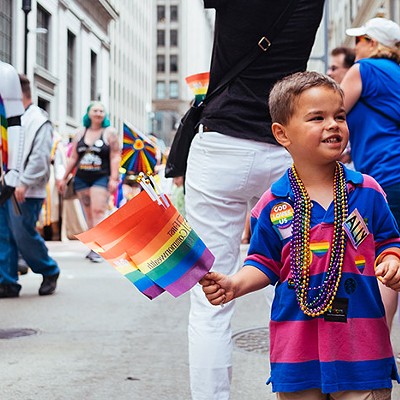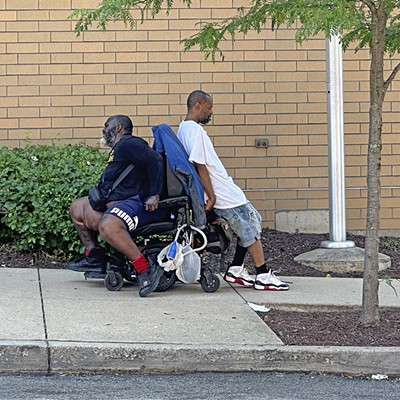The political battle over Allegheny County's proposed conversion-therapy ban, explained
[
{
"name": "Local Action Unit",
"component": "24929589",
"insertPoint": "3",
"requiredCountToDisplay": "1"
}
]
With local elections right around the corner, the topic of conversion therapy is emerging as a key issue in races for Allegheny County Council.
Earlier this year, legislation to ban conversion therapy countywide was proposed in the county council chambers. Conversion therapy is a psychological or spiritual intervention used to attempt to change an LGBTQ person’s sexual orientation to straight.
The bill was introduced in March by Democrats and would ban the practice for minors within in the county, including counseling from religious leaders. For some Democratic county council candidates, conversion therapy has become a key issue.
But late last month, county council Republicans introduced a conversion therapy ban that would be weaker than the Democrats' proposal and would ban conversion therapy only in some instances. The Republican bill, introduced by County Coucilors Sue Means (R-Bethel) and Sam DeMarco (R-North Fayette), focused on banning involuntary therapy along with any physically harmful practices related to conversion therapy.
While the legislation bans anything that could cause a minor “physical pain,” the bill does not ban talk therapy or other forms of conversion therapy practices, including those carried out by religious leaders. Means said the Democratic bill could infringe on parental rights in addition to limiting children’s ability and rights to seek help.
To voters, the republican opposition might seem like a half measure because large health-care organizations say that a weaker ban leaves openings that could potentially harm LGBTQ youth in Allegheny County.
Conversion therapy is opposed by the American Psychiatric Association (APA), the American Medical Association, the American College of Physicians and the National Association of Social Workers. According to the American Association of Child and Adolescent Psychiatry (AACAP), variations in sexual orientation and gender expression are a normal part of human development. Research conducted by the AACAP indicates “it is unlikely that individuals will be able to reduce same-sex attractions or increase other-sex sexual attractions through SOCE [sexual orientation change efforts].”
The American Academy of Pediatrics believes counseling can be useful to adolescents who are uncertain about their sexual orientation or how to express it, but is opposed to therapy specifically intending to change sexual orientation. And according to the Trevor Project, a crisis and suicide intervention organization for LGBTQ people under 25, “parents who send their child to conversion therapy instill feelings of family rejection and disappointment and risk seriously fracturing their relationship with their child.”
As previously reported by Pittsburgh City Paper, the APA found that LGBTQ young adults who reported higher levels of family rejection during adolescence were more than eight times as likely to report having attempted suicide.
In 2016, Shawn O’Donnell, a 40-year old survivor living near Chicago told CP that he attempted suicide twice during more than a decade in and out of conversion therapy at the hands of both licensed therapists and faith leaders.
Pittsburgh became the first municipality in Pennsylvania to ban conversion therapy for minors in 2016. The law was introduced by Pittsburgh Council President Bruce Kraus (D-South Side), who is openly gay. He called conversion therapy a "barbaric practice."
Sixteen states, along with Washington, D.C. and Puerto Rico, have laws regulating or banning conversion therapy practices for minors. In April, the Supreme Court refused to challenge New Jersey’s Anti-Conversion Therapy law for the third time since it originally passed in 2013. This April, a bill that would ban conversion therapy across Pennsylvania was introduced in Harrisburg with more than 25 co-sponsors and some bi-partisan support.
With a growing movement and consensus building to ban conversion therapy outright, who is exactly is behind the Republican-backed county council bill?
Means’ bill is being supported by the Pennsylvania Family Institute, a major statewide right-wing, anti-LGBTQ organization. PFI has come under criticism from GLAAD for having employees that have called homosexuality “disgraceful.” The Southern Poverty Law Center has also pointed out that PFI’s Independence Law Center has worked with Alliance Defending Freedom on a lawsuit in Pennsylvania in 2017 on behalf a male student who claimed his privacy was violated and he was sexual assaulted because a transgender student was in the boys’ locker room while he was changing clothes. SPLC designates the Alliance Defending Freedom an anti-LGBT hate group.
Means and County Councilor Cindy Kirk (R-Wexford) were praised for their opposition to the Democratic ban by The American Family Association of Pennsylvania (AFA). The association views the bill as an “attack on parental rights and the First Amendment rights of therapists” and issued a call to their members in March to support Means and Kirk, as well as convince other councilors to oppose the Democratic conversion-therapy ban.
The SPLC classifies the AFA as an anti-LGBT hate group. An AFA “Action Alert” from Jul. 20, 2012 reads “homosexuality is a poor and dangerous choice, and has been proven to lead to a litany of health hazards to not only the individuals but also society as a whole.”
In 2010, Bryan Fischer, now former AFA director of Issue Analysis for Government and Public Policy said “homosexuality gave us Adolf Hitler, and homosexuals in the military gave us the Brown Shirts, the Nazi war machine and six million dead Jews.”
Both Means and Kirk are being challenged by Democrats who support a full conversion-therapy ban, Thomas Duerr and Christine Allen, respectively. The election is Nov. 5.
Earlier this year, legislation to ban conversion therapy countywide was proposed in the county council chambers. Conversion therapy is a psychological or spiritual intervention used to attempt to change an LGBTQ person’s sexual orientation to straight.
The bill was introduced in March by Democrats and would ban the practice for minors within in the county, including counseling from religious leaders. For some Democratic county council candidates, conversion therapy has become a key issue.
But late last month, county council Republicans introduced a conversion therapy ban that would be weaker than the Democrats' proposal and would ban conversion therapy only in some instances. The Republican bill, introduced by County Coucilors Sue Means (R-Bethel) and Sam DeMarco (R-North Fayette), focused on banning involuntary therapy along with any physically harmful practices related to conversion therapy.
While the legislation bans anything that could cause a minor “physical pain,” the bill does not ban talk therapy or other forms of conversion therapy practices, including those carried out by religious leaders. Means said the Democratic bill could infringe on parental rights in addition to limiting children’s ability and rights to seek help.
To voters, the republican opposition might seem like a half measure because large health-care organizations say that a weaker ban leaves openings that could potentially harm LGBTQ youth in Allegheny County.
Conversion therapy is opposed by the American Psychiatric Association (APA), the American Medical Association, the American College of Physicians and the National Association of Social Workers. According to the American Association of Child and Adolescent Psychiatry (AACAP), variations in sexual orientation and gender expression are a normal part of human development. Research conducted by the AACAP indicates “it is unlikely that individuals will be able to reduce same-sex attractions or increase other-sex sexual attractions through SOCE [sexual orientation change efforts].”
The American Academy of Pediatrics believes counseling can be useful to adolescents who are uncertain about their sexual orientation or how to express it, but is opposed to therapy specifically intending to change sexual orientation. And according to the Trevor Project, a crisis and suicide intervention organization for LGBTQ people under 25, “parents who send their child to conversion therapy instill feelings of family rejection and disappointment and risk seriously fracturing their relationship with their child.”
As previously reported by Pittsburgh City Paper, the APA found that LGBTQ young adults who reported higher levels of family rejection during adolescence were more than eight times as likely to report having attempted suicide.
In 2016, Shawn O’Donnell, a 40-year old survivor living near Chicago told CP that he attempted suicide twice during more than a decade in and out of conversion therapy at the hands of both licensed therapists and faith leaders.
Pittsburgh became the first municipality in Pennsylvania to ban conversion therapy for minors in 2016. The law was introduced by Pittsburgh Council President Bruce Kraus (D-South Side), who is openly gay. He called conversion therapy a "barbaric practice."
Sixteen states, along with Washington, D.C. and Puerto Rico, have laws regulating or banning conversion therapy practices for minors. In April, the Supreme Court refused to challenge New Jersey’s Anti-Conversion Therapy law for the third time since it originally passed in 2013. This April, a bill that would ban conversion therapy across Pennsylvania was introduced in Harrisburg with more than 25 co-sponsors and some bi-partisan support.
With a growing movement and consensus building to ban conversion therapy outright, who is exactly is behind the Republican-backed county council bill?
Means’ bill is being supported by the Pennsylvania Family Institute, a major statewide right-wing, anti-LGBTQ organization. PFI has come under criticism from GLAAD for having employees that have called homosexuality “disgraceful.” The Southern Poverty Law Center has also pointed out that PFI’s Independence Law Center has worked with Alliance Defending Freedom on a lawsuit in Pennsylvania in 2017 on behalf a male student who claimed his privacy was violated and he was sexual assaulted because a transgender student was in the boys’ locker room while he was changing clothes. SPLC designates the Alliance Defending Freedom an anti-LGBT hate group.
Means and County Councilor Cindy Kirk (R-Wexford) were praised for their opposition to the Democratic ban by The American Family Association of Pennsylvania (AFA). The association views the bill as an “attack on parental rights and the First Amendment rights of therapists” and issued a call to their members in March to support Means and Kirk, as well as convince other councilors to oppose the Democratic conversion-therapy ban.
The SPLC classifies the AFA as an anti-LGBT hate group. An AFA “Action Alert” from Jul. 20, 2012 reads “homosexuality is a poor and dangerous choice, and has been proven to lead to a litany of health hazards to not only the individuals but also society as a whole.”
In 2010, Bryan Fischer, now former AFA director of Issue Analysis for Government and Public Policy said “homosexuality gave us Adolf Hitler, and homosexuals in the military gave us the Brown Shirts, the Nazi war machine and six million dead Jews.”
Both Means and Kirk are being challenged by Democrats who support a full conversion-therapy ban, Thomas Duerr and Christine Allen, respectively. The election is Nov. 5.

















